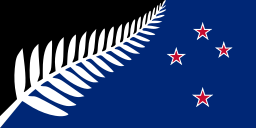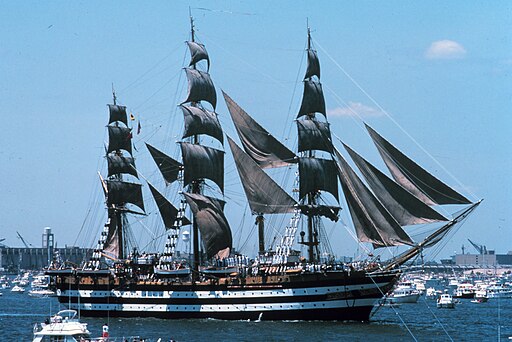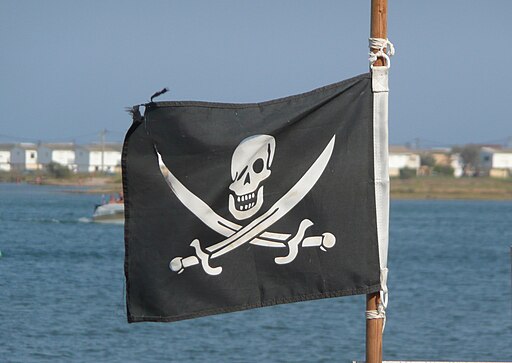There is a tide (Shakespeare informs us), in the affairs of men, which, taken at the flood, leads on to fortune. Omitted, all the voyage of their life is bound in shallows and in miseries. On such a full sea are we now afloat, and we must take the current when it serves, or lose our ventures.
What Shakespeare is saying (or would be if he had sufficient foresight) is that New Zealand should change its flag, and so doing, steer the ship of state toward our remarkable and unexpected destiny. His metaphor is a well chosen one.
Let me explain.
The present referendum is our Prime Minister’s idea. It’s to be a two-part postal referendum: in the first, we’ll narrow down a shortlist of four to the lead contender, and in the second, we’ll choose between that and the status quo.
It’s rather like the America’s Cup, really: contenders fight for the right to duke it out with the present holder of the title. Unfortunately, the long-list of forty was released to the general public, even though they were not permitted to have a say on which made it to the short-list – rather like allowing thirty-six yachts to sail past but not to actually race.
We are now in the first (or Louis Vuitton) stage of proceedings, in which we are asked to rank the four contenders in order of preference. And here they are, not in order of preference (or at least, not mine):
 This design, by Kyle Lockwood, is probably closest to our present flag, at least in the lower right, and maintains the traditional red, white and blue colour scheme.
This design, by Kyle Lockwood, is probably closest to our present flag, at least in the lower right, and maintains the traditional red, white and blue colour scheme.
 Great minds think alike, you say (or fools seldom differ, depending on your vexillological tastes), but no, this design is also from the teeming brain of Kyle Lockwood.
Great minds think alike, you say (or fools seldom differ, depending on your vexillological tastes), but no, this design is also from the teeming brain of Kyle Lockwood.
 This design, from Andrew Fyfe, of a simple black and white koru is, in my opinion, the winner of the unofficial “which flag will look best whilst burning” competition.
This design, from Andrew Fyfe, of a simple black and white koru is, in my opinion, the winner of the unofficial “which flag will look best whilst burning” competition.
There is also talk of including the Red Peak design (by Aaron Dustin) but as of this writing, no decision has been made – or at least, no decision has been announced.
It is, however, the fourth of the designs on the current short-list (designed by Alofi Kanter), which is my favourite.
Please, do not mistake me for a rabid sports fan. I can, if I concentrate, remember which sort of oval-ball game it is the All Blacks play, but that is about the extent of my sporting knowledge and interest. I do not even own a pair of red socks. No, I favour this design for two simple reasons.
The first is its similarity to this, the flag of anarcho-pacifism:
 New Zealand has long been a leader when it comes to waging peace. Te Whiti o Rongomai, one of my personal heroes, was leading indigenous people in non-violent resistance before Gandhi was born or thought of.
New Zealand has long been a leader when it comes to waging peace. Te Whiti o Rongomai, one of my personal heroes, was leading indigenous people in non-violent resistance before Gandhi was born or thought of.
Later, we declared our entire nation a nuclear-free zone – despite being the first to split the atom. This was enforced, even to the extent of refusing to allow the vessel bearing our own Head of State to enter our waters. (For the record, totally the Royal Navy’s fault. They refused to “confirm or deny” that they had nuclear material on the Royal Yacht Britannia alongside the Queen.)
Let us be frank: New Zealand has never been known for its devotion to, or respect for its leaders. Hierarchical we are not. Hence the anarcho-pacifism.
The second reason is that black and white flags are traditionally emblematic of pirates. But wait, I hear you say. How can you possibly pair anarcho-pacifism with anything of the genus Jolly Roger? Isn’t it a symbol of murder and mayhem? Well, no. Pirates didn’t actually fight under it.
To my surprise on looking into the subject, I found that the black and white flag was not flown by pirates all the time, but only when about to attack. (You are not helping your case, I hear you say. Bear with me.) Pirates would fly false colours – or no colours – until they had approached their prospective victim, at which point they would run up the jolly black-and-white: declaring their intentions, rather like a Victorian suitor.
The ship thus surprised then had the choice of surrendering or fighting. If they decided to surrender, they would be spared. If they decided to fight, the pirates would then run up a red flag: no quarter would then be given. (Privateers, on the other hand, weren’t allowed to kill you regardless of how hard you had fought before you surrendered.)
I have even heard it said that any ship flying under a black and white flag can, under international law, be treated as a pirate ship, but, to quote Wikipedia, [citation needed].
New Zealand is a nation surrounded by water (in fact, the furthest you can get from the coast is in the middle of a lake) and therefore eminently suited for being a pirate nation. With our cheerful disregard for other nations’ demands (surrender those children to the Communists, stay away from that atoll…) we are half-way there already.
In fact, with the TPPA demanding that we extend copyright protection to seventy years after the creator has shuffled off this mortal coil, now is an excellent time to go pirate. Being pacifist pirates, we will of course resort only to culture piracy, which unlike old-school piracy ensures that, post-pirating, the piratee still has their goods (this in kindergarten lingo is known as “sharing”).
Furthermore, anarcho-pacifism and piracy are practically enshrined in our national anthems. “Confound their politics / frustrate their knavish tricks” says the one (that’s the anarchism) and “Peace not war shall be our boast,” says the other (that’s the pacifism), going on to add “May our mountains ever be / freedom’s ramparts on the sea” (that’s the piratical bit).
The whole point of a flag (although to be fair, flags aren’t usually pointed, unless you’re Nepal) is that it is symbolic of the entity it represents, in this case, the country of New Zealand. As the flag is, so shall the nation be.
I therefore call upon the people of New Zealand to use their Louis Vuitton vote to move our nation one step closer to fulfilling its destiny, as the world’s first anarcho-pacifist pirate state. Arrr.









